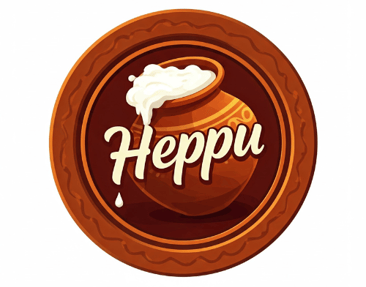
Heppu - The Dairy Shop
Claypot Difference
5/20/202510 min read
Heppu – The Dairy Shop: Championing Fresh, Sustainable Dairy in Bangalore
Urban dairy shoppers often face a dilemma: the milk and curds on offer can be over-processed, diluted, or even adulterated. In India, large-scale surveys have shown that a majority of milk samples fail safety standards due to water, detergents, and other contaminantscseindia.org. In fast-growing cities like Bangalore, consumers are increasingly wary of such quality issues. In fact, a recent study of Bengaluru’s dairy consumers found that “Demand for farm-fresh milk is driven by concerns for freshness, quality, and health”papers.ssrn.com. Heppu – The Dairy Shop was founded to address exactly these concerns. It offers small-batch, farm-direct dairy products to city customers, reconnecting urban families with the taste and nutrition of traditionally made, local milk and curd. By controlling every step – from cow to consumer – Heppu promises transparency and trust that mass-market milk can’t match.
“At Heppu, we are dedicated to providing freshly made, naturally fermented curd, made with care and tradition.” – Heppu The Dairy Shop
Heppu’s origin story reflects its mission. Founded in Vidyaranyapura, Bangalore, by local dairy enthusiasts, the brand was born out of frustration with impersonal milk vendors and pasteurized products that lacked flavor. Heppu’s vision is to revive “home-style goodness” in dairy by using traditional methods and caring for the herd and environment. The name Heppu itself suggests “learning” or “wisdom” – a nod to respecting age-old practices. The team emphasizes ethical animal care (cows and buffaloes graze on their own Bangalore-area farm) and a farm-to-table approach that keeps the supply chain short. In short, Heppu’s mission is to bring healthful, authentic dairy back to urban tables.
Unique Product Offerings
Heppu stands out with a range of artisanal dairy products that goes beyond ordinary milk:
Claypot Curd – Heppu ferments fresh A1/A2 cow’s milk in unglazed clay pots (matkas), just like homemade curd. The porous clay moderates temperature and moisture, creating a cool, humid environment that preserves freshness and nutrientsvillagedecor.in. This slow, natural fermentation yields a thick, creamy curd with a uniquely earthy flavor. (Heppu’s social media touts this as “Farm Fresh Claypot Curd – Home-style goodness made from A1 & A2 milk.”) In short, claypot curd at Heppu tastes closer to grandmother’s recipe than factory-batch yogurt.
A1 and A2 Cow Milk – Most commercial milk blends different cow breeds, but Heppu carefully separates A1 milk (from exotic Holstein/Friesian cows) and A2 milk (from native/desi cows). A2 milk has garnered attention as a “healthier” choice: some studies suggest it may be easier to digest and gentler for those with milk sensitivitieshealthline.com. Heppu’s cows are grass-fed and hormone-free, so the milk is fully raw (only gently chilled, never ultra-pasteurized) to retain its natural enzymes. By offering both types, Heppu lets customers choose their preferred milk type – a niche virtually unavailable in regular city dairies.
Buffalo Milk – Buffalo milk is richer and fattier than cow’s milk, prized for making ghee and rich sweets. Importantly, buffalo milk is naturally A2-type (it contains only A2 β-casein, like other non-cow milks)en.wikipedia.org. Heppu sources pure-bred Murrah buffalo milk from its farm, offering a high-calcium, high-protein milk option often missing in urban markets.
Fresh Lassi and Buttermilk – Using their farm-fresh yogurt, Heppu whips up chilled lassis (plain or fruit-flavored) and tangy buttermilk. These probiotic drinks capture traditional recipes – no powdered mixes or preservatives. Customers rave about the thick “home-made lassi” texture and natural sweetness.
White Butter (Benne) – Heppu churns fresh cream into traditional Indian-style white butter (benne), just as villages do. Traditional butter is enjoying a comeback as a “clean label” productberlinpackaging.com – it has just cream and culture, no artificial additives. Heppu’s butter is prized for its rich aroma and spreadability, a far cry from mass-market yellow spreads.
Almond Milk – Beyond dairy, Heppu offers house-made almond milk for lactose-intolerant or vegan customers. Made by grinding soaked almonds with water and straining, this almond milk has a natural nutty flavor and no gums or stabilizers. It rounds out the menu for health-conscious shoppers seeking plant-based options.
Each product is made in very limited quantities to ensure absolute freshness. Heppu typically milks twice a day, and any product (milk, curd, butter) unsold by evening is discarded or used internally. This guarantees that customers buy dairy that was practically sitting on the farm just hours earlier. Heppu’s emphasis on small-scale production – only what local demand can absorb each day – stands in stark contrast to industrial dairies that produce relentlessly.
Freshness and Traditional Methods
A key to Heppu’s appeal is how its products are made. The brand deliberately employs time-honored techniques that enhance taste and nutrition:
Claypot Fermentation: As noted, fermenting curd in clay (matka) yields superior results. Clay’s pores wick away heat and excess moisture, keeping the curd cool during fermentationvillagedecor.invillagedecor.in. The result is a thicker, creamier yogurt with a subtle earthen aroma. Nutrients are better preserved because the curd isn’t overheated. Clay pots also impart a trace of earthy minerals, enriching the taste. Importantly, clayware is biodegradable and toxin-free, unlike plastic containers – reinforcing Heppu’s eco-ethosvillagedecor.in.
Raw, Unpasteurized Milk: Heppu avoids the high-heat ultra-pasteurization common in packaged milk. Instead, milk is filtered and chilled immediately after milking. This minimal processing helps retain heat-sensitive vitamins and beneficial bacteria. Customers report no “cooked” taste. It’s a nod to traditional fresh milk – the kind used in backyard dairies – without compromising safety.
Limited Batch & Speed: By milking cows twice daily on a strict schedule, Heppu ensures that milk reaches consumers the same day. Bulk industrial dairies often blend days-old milk and use preservatives to prolong shelf life; Heppu goes the opposite way. Each morning’s yield goes into morning deliveries and shop sales, with evening milking reserved for that night’s batch. This rapid cycle (often called “just-in-time dairy”) means no sitting in a warehouse. Quality control is rigorous: milk is tested daily for acidity and cleanliness.
These practices underline Heppu’s credo that freshness is paramount. In a world of shelf-stable milk, the difference in Heppu’s products is immediately noticeable. Fans often say Heppu milk “smells sweet” and curd is “full of life.” This freshness ties back to consumer health: one study notes that truly farm-fresh milk has higher nutrient levels and no dilutioncseindia.orgkabilaifarm.com. By steering clear of additives, Heppu delivers dairy “as nature intended.”
Sustainability and Ethics
Heppu’s business isn’t just about better taste – it’s built around sustainable, ethical practices at every step:
Ethical Animal Care: Heppu’s cows and buffaloes are raised on their own organic farm on Bangalore’s outskirts. The herd grazes on pesticide-free grasses, with supplementary millets and legumes. Importantly, Heppu does notforce over-production: cows are milked only enough to meet daily demand. If an animal is unwell, it’s treated naturally or rested; no growth hormones or routine antibiotics are used. This humane approach aligns with traditional Indian reverence for cows. As one researcher notes, Indian urban dairy consumers are still deeply influenced by “the cultural and religious significance of the cow,” which motivates safer, kinder dairy practicespapers.ssrn.com. In short, happy cows produce better milk.
Eco-Friendly Packaging: Heppu packages products in glass bottles and reusable clay pots whenever possible. Fresh curd comes in sealed earthenware matkas, while milk is sold in glass bottles (customers return bottles for re-use). Even disposable items like labeling and bags are made from recycled or compostable materials. This attention to packaging addresses a modern trend: consumers now demand eco-conscious design in dairy goodsberlinpackaging.com. Industry reports highlight that today’s buyers expect recyclability and transparency in food packagingberlinpackaging.com. Heppu’s green choices show it’s listening.
Farm-to-Table Logistics: Unlike conventional supply chains that span hundreds of kilometers, Heppu’s entire operation is local. Milk doesn’t travel by truck from some distant dairy; it moves by van (or even bicycle delivery) straight from Heppu’s farm to its shops. This short farm-to-table loop dramatically cuts carbon emissions from transport and refrigeration. It also maximizes traceability: customers can literally ask “which cow provided this glass of milk?” A recent analysis of Bangalore dairies praised such direct producer-to-consumer networks (often called alternative food networks) for exactly this reason – they let people truly know the origins of their dairypapers.ssrn.com.
In summary, Heppu’s sustainability is holistic: from soil to shelf, every decision minimizes ecological impact and prioritizes animal welfare and natural living. Modern customers prize these values. As one packaging industry expert observes, today’s shoppers are “attentive to the carbon footprint of dairy farming and the ethical treatment of animals” – and they reward brands that respond with genuine eco-friendly sourcing and designberlinpackaging.com. By being transparent about their small, local system, Heppu earns consumer trust.
Operations: Farm-to-Table Excellence
Behind Heppu’s storefronts lies a tightly run operation. All products originate on the same few-acre farm in Bengaluru’s outskirts. Each day, milk is collected fresh twice – once at dawn and once before evening milking – to capture peak freshness. In these sessions, heifers and cows are gently milked by hand or small modern milking machines, and the milk immediately undergoes quality checks for purity and acidity. No third-party farm is involved: this direct sourcing guarantees that no unknown additives or antibiotics enter the supply.
After collection, the milk is cooled and transported straight to Heppu’s Vidyaranyapura and Sahakarnagar outlets. Here it’s processed into various products on-site or distributed. For example, the morning milk is partly set into claypots for afternoon curd, while excess cream is churned into butter. Heppu even operates as a mini-dairy – they employ traditional butter churns (Gaddi chakkis) and hand-creamed yogurt vessels – rather than a single gigantic factory line. This artisanal scale means every batch is monitored by the owner and a small team.
Crucially, Heppu offers home delivery to Bangalore neighborhoods. Customers can order by phone or WhatsApp and receive their milk, curd, and buttermilk doorstep within hours. This service taps into a massive trend: India’s online grocery market is skyrocketing. Recent data shows India’s online grocery sector (including fresh produce and dairy) hit nearly $8.8 billion in 2024 and is projected to grow ~45% annually through 2030grandviewresearch.com. Tech platforms have reshaped urban shopping: as one report notes, apps covering cities like Bengaluru are making it easy to order daily essentials on demandgrandviewresearch.com. Heppu leverages this boom by marrying old-world products with modern convenience. In practice, the farm-fresh milk you order at 6 PM may have been skimmed from the cow that very morning.
Quality control is built into this model: with such short timelines, any off-flavor or impurity is obvious immediately and culled. Customers routinely note that Heppu’s milk never tastes “flat” or “sour,” unlike long-stored retail milk. This operational rigor – own farm, twice-daily supply, constant testing, and rapid delivery – is at the heart of Heppu’s promise of excellence.
Market Trends Supporting Heppu
Heppu’s approach isn’t just a quaint niche; it rides several powerful consumer trends:
Natural, Traditional Foods: Consumers globally (and in India) have turned back to minimally processed foods. Industry analysts report a surge in demand for “natural” dairy: full-fat milk, artisanal cheeses, and traditional butters are growing in popularity as shoppers seek “simple ingredient” productsberlinpackaging.com. Heppu’s portfolio perfectly fits this trend. Its products are unprocessed and reminiscent of traditional fare, meeting the consumer craving for authenticity. (Research notes that brands are even adopting minimalist packaging to signal purityberlinpackaging.com – Heppu does this naturally by using clay pots and clear glass.)
Health and Wellness: Interest in probiotics, gut health, and native breeds has boosted the appeal of raw, A2-type dairy. A2 milk demand, in particular, is surging: industry forecasts predict India’s A2 milk market (which was about $416 million in 2024) will roughly triple by 2030, growing at ~20% annuallygrandviewresearch.com. Heppu’s clear labeling of A2 vs. A1 milk taps into this. Its product variety (including probiotic lassi and yogurt) aligns with the trend towards functional foods rich in beneficial bacteria.
Home Delivery & E-Grocery: With internet penetration and smartphones on the rise, Indians are embracing online grocery. The home-delivery market for fresh food is explodinggrandviewresearch.com. Heppu is well-positioned here; it’s essentially an expert-quality grocery item ready for app-ordering. This on-demand convenience means even time-strapped city workers can enjoy farm-fresh dairy daily.
In sum, market research is unequivocal: people want fresher, healthier, local and sustainable foods more than everpapers.ssrn.comgrandviewresearch.comgrandviewresearch.com. Heppu’s model is aligned with these macro trends, suggesting its continued growth and impact.
Customer and Community Impact
Heppu’s customers don’t just buy better dairy—they become part of a healthier, more sustainable community. By choosing Heppu over impersonal brands, families get tangible benefits:
Superior Quality: Local dairy experts point out that buying directly from farmers yields “better quality products” that are fresher and often cheaper in value per unitkabilaifarm.com. Since Heppu’s products skip the industrial middlemen, customers enjoy richer nutrition and taste. As one blogger notes, unlike mass-market milk “chemically treated” for shelf life, local farm milk comes “fresh and without harmful chemicals”kabilaifarm.com. Many Heppu patrons find their digestive issues lessen or disappear by switching, thanks to the pure A2 and live-culture content.
Community Support: Every purchase at Heppu directly supports the local farm and shop staff. This is a classic win-win: your money stays in the neighborhood. Studies of community-based dairy models have found they give urban farmers a viable livelihood and connect consumers to the sourcepapers.ssrn.com. In Heppu’s case, buying a pot of curd or a bottle of milk means supporting an individual family’s farm, not a distant corporate dairy. According to local dairy farm advocates, such support not only helps small businesses survive, but also “improves the economy” of the community through taxes and jobskabilaifarm.comkabilaifarm.com.
Environmental and Social Good: Beyond the farm, Heppu’s model reduces carbon footprint and plastic waste (thanks to low-mileage delivery and reusable containers). It also educates consumers, especially children, about sustainable food cycles. Customers often tell stories of bringing kids to visit the cows at the farm – a small community outreach that big dairies never offer.
In short, the ripple effects of supporting Heppu extend beyond nutrition. Customers gain health and taste benefitskabilaifarm.com, local farmers earn fair pay, and the community reaps economic and environmental rewardskabilaifarm.com.
Expansion and Future Outlook
Heppu started with one neighborhood store and stall at a local market, and word-of-mouth has fueled its growth. It has since opened multiple outlets in Bangalore’s north (Vidyaranyapura and Sahakarnagar) and participates in weekend farmers’ markets. The founders aim to replicate this model in other areas of Bangalore, building partnerships with more apartment complexes and online platforms. As the demand for its products grows, Heppu is also exploring value-added offerings like organic cheese or premium A2 ghee. Throughout expansion, the core strategy remains the same: limited scale, uncompromised quality.
Industry observers note that small, quality-focused dairies can capture a loyal niche in India’s massive milk market by appealing to evolving consumer valuesberlinpackaging.compapers.ssrn.com. If Heppu expands thoughtfully – adding more delivery routes and farm capacity without abandoning its hands-on ethos – it could set a template for others.
Conclusion and Call to Action
Heppu – The Dairy Shop demonstrates that healthy, high-quality, and sustainable dairy is not just a lofty ideal but a practical business model. By combining traditional production methods with modern home delivery, it provides Bangaloreans with fresh, trustworthy dairy that benefits people, animals, and the planet. As more customers seek real food and cleaner practices, businesses like Heppu deserve our support. Next time you reach for a milk brand, consider choosing a local farm-fresh option. Supporting Heppu means investing in your family’s health and in a greener food system. Let’s champion vendors who put quality and ethics first – because everyone deserves a wholesome glass of milk.
Join the farm-to-table dairy revolution: try Heppu today and feel the difference of truly fresh, sustainable dairy!




